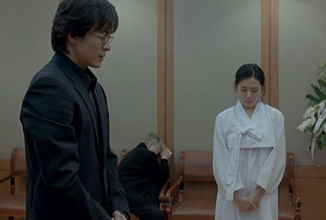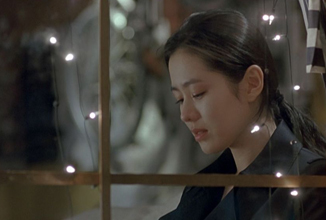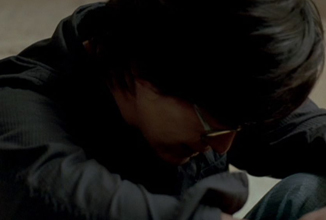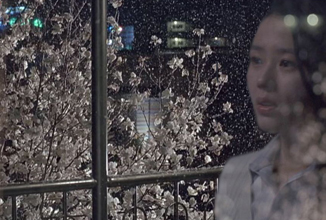"I hope he comes out of the coma, so I can at least get an explanation."
Synopsis:
Concert lighting director, In-su (Bae Yong-joon), is preparing for an upcoming concert when he receives a phone call from the hospital. Rushing to the intensive care unit, he discovers that his wife, Su-jin (Im Sang-hyo), has been involved in a car accident which has left her in a coma and, while there, he encounters Seo-young (Son Ye-jin), whose husband, Kyung-ho (Kim Kwang-il), was in the car with Su-jin and is also in a coma. As In-su and Seo-young begin to sort through their spouses' belongings, they discover condoms, phone text messages between the two, as well as an intimate video clip of them together, and must face the realisation that Su-jin and Kyung-ho were having an illicit affair. Brought closer by mutual grief, increasing feelings of betrayal and uncertainty about their (and their respective spouses') futures, In-su and Seo-young soon find themselves being inextricably drawn to also begin an affair...
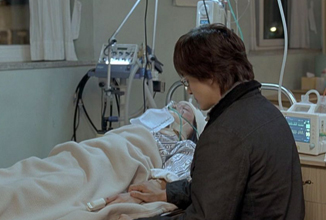 |
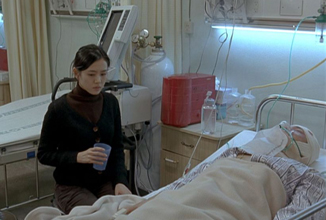 |
Review:
April Snow flopped on its cinema release in Korea but, even though the film doesn't elicit viewer empathy quite as effortlessly as some of Hur Jin-ho's other work (most notably Christmas In August), its failure in its home country is rather a shame, nonetheless. Plot wise, April Snow is a dark and melancholy affair, largely focusing on the desperate attempts of the two main characters to deal with the emotional fallout caused by both their spouses' critical conditions and also their betrayal, and it quickly becomes apparent that In-Su and Seo-young's differing reactions to the ongoing situation are greatly influenced by their respective places within Korean society:
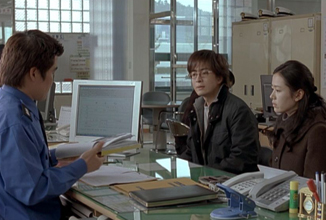 |
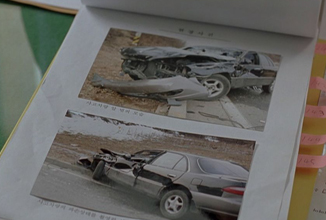 |
Up until his wife's accident, In-su had little to worry about in his life. A confident and successful career man with a (seemingly) happy marriage, the discovery of his wife's infidelity hits him like a bolt out of the blue, forcing him to reassess what he believed his relationship to be and, consequently, view almost every aspect of his life from an entirely new perspective, tainted by hindsight. He pretty much falls apart but, even as his life and career begin to go into freefall, his long-built confidence and self esteem refuse to allow him to process the reality of the situation rationally, or even entertain the idea that he could be in any way (directly or indirectly) responsible for Su-jin's affair, and he increasingly resorts to bitter self pity ("Why didn't you just die?") and thoughts of getting even with her ("What will you do if she wakes up?"... "I'll get revenge").
Conversely, Seo-young is the archetypal classic Korean housewife, whose entire focus has been taking care of her husband (i.e. her family) and providing as much love, support and nurturing as she thought he could possibly need. Unlike In-su, her unconditional love of her husband (even in spite of his infidelity) is never in doubt and, when she initially learns of his affair, she immediately looks to herself for the cause ("I don't know what I did wrong"), while yearning for her husband's reassurance that his affair wasn't her fault, and hoping to somehow find a rational reason for everything that has taken place ("I hope he comes out of the coma, so I can at least get an explanation").
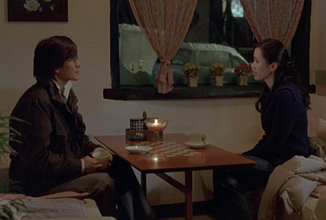 |
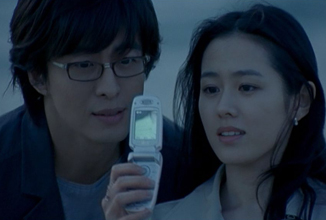 |
Though it's clear that In-su and Seo-young are instantly attracted to each other, their similar feelings (of heartbreak and betrayal) and the mirrored situations they each face, also play a part in their decision to begin an affair. However, it is also implied that, by doing so, both are subconsciously attempting to feel better about themselves by proving that they are still attractive to the opposite sex, while, at the same time, trying to dispel any niggling fears that Su-jin and Kyung-ho might have been using their liaisons to fulfill what they felt their marriages were lacking.
As In-su and Seo-young's relationship becomes more intimate, and eventually sexual, the similarities to their spouses' affair is impossible to deny, and while these bring to the surface feelings of both "history is doomed to repeat itself" and "two wrongs don't make a right", when one of the spouses wakes from his/her coma, In-su and Seo-young are also faced with some tough decisions which refuse to be put off any longer.
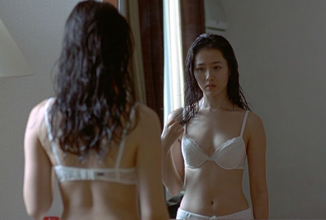 |
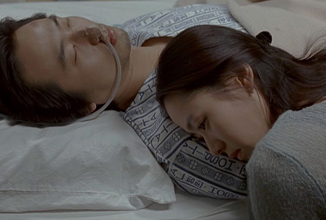 |
Finally, like many of Hur Jin-ho's other films, April Snow references the changing seasons throughout. Early on, a discussion of In-su and Seo-young's favourite times of the year (for In-su, winter; for Seo-young, spring) seems to simply facilitate the two characters learning more about each other but, as the slightly ambiguous ending of the film begins to play, that conversation is referenced once more (also linking to the film's title) and, very subtly, tells viewers everything they need to know.
Cast:
As the plot of April Snow centres, almost exclusively, on In-su and Seo-young, their roles form the bulk of the character depth within the film:
As always, Son Ye-Jin (as Seo-young) gives an impassioned, yet beautifully nuanced, performance, providing the majority of the emotional resonance throughout. Repeatedly required to show her character's heart breaking (often with little dialogue), she effortlessly succeeds on every occasion, and there can be no question that the tears, which we regularly see her crying, are painfully real.
Bae Yong-joon (as In-su) largely gives a decent enough performance but, on several occasions, it is so deeply understated that it almost seems that he is conveying no feelings whatsoever (rather than achieving the desired effect of showing In-su as a rather closed individual), and it is left to Son Ye-jin, once again, to raise the emotional content of proceedings - something which she can, thankfully, always be relied upon to do.
Note should also be made of the main love scene between In-su and Seo-young: Deftly traversing a line between desperate need, ever-deepening love and unbridled passion, it positively breathes sensuality on a level rarely seen, even in Korean cinema and, combined with incredibly intimate framing and intelligent camera work, manages to remain well within the realms of decency while feeling totally uncensored. There are many memorable scenes within April Snow, but the aforementioned love scene easily remains in the mind more than any other. Astonishing.
Summary:
A melancholy tale of love and betrayal, April Snow may not be as instantly accessible as some of Hur Jin-ho's other films, but is a worthy addition to his CV, nonetheless.
Cast (Actor...
Character):
Bae Yong-joon as In-su
Son Ye-jin as Seo-young
Im Sang-hyo as Soo-jin
Kim Kwang-il as Kwang-il
DVD
The DVD
edition reviewed here is the Korean (Region 3) Enter One Special Edition 2-Disc release. The film itself is
provided as an anamorphic transfer with an aspect ratio of 1.85:1 and there are no image artifacts (and no ghosting) present.
The original Korean
language soundtrack is provided as a choice of Dolby Digital 5.1 and Dolby Digital 2.0 and is well balanced throughout.
The main feature subtitles provided are generally of good quality, with only the odd apostrophe missing from the text.
English-speaking viewers should note that, as with many Korean DVD releases, there are no subtitles available on any of the extras.
DVD
Details:
• Director: Hur Jin-ho
• Format: NTSC,
Anamorphic, Widescreen, Subtitled
• Language: Korean
•
Subtitles: English/Korean
•
Sound: Dolby Digital 5.1, Dolby Digital 2.0
• Region: Region 3
• Aspect Ratio:
1.85:1
• Number of discs: 2
• Classification: R
• Studio:
Enter One
• Run Time: 105 minutes (approx.)
DVD Extras:
- Making Of Featurette
- Deleted scenes
- NG Cut
- Self Camera
- Promotion
- Music Video
- Theatrical Trailer
- TV Spot
|












